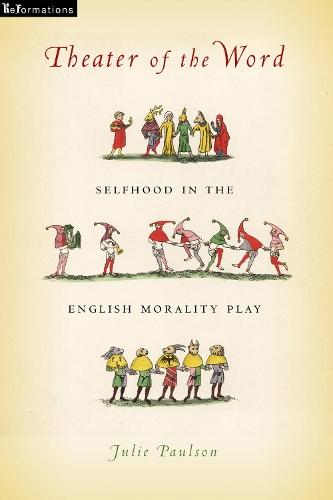Full Product Details
Author: Julie Paulson
Publisher: University of Notre Dame Press
Imprint: University of Notre Dame Press
Dimensions:
Width: 15.20cm
, Height: 1.80cm
, Length: 22.90cm
ISBN: 9780268104610
ISBN 10: 0268104611
Pages: 277
Publication Date: 30 April 2019
Audience:
Professional and scholarly
,
Professional & Vocational
Format: Hardback
Publisher's Status: Active
Availability: In Print

This item will be ordered in for you from one of our suppliers. Upon receipt, we will promptly dispatch it out to you. For in store availability, please contact us.
Reviews
An insightful and elegant approach to late medieval and early modern morality plays, ritual practice, and selfhood, this book offers a much needed study of the morality play. It is beautifully written and full of thoughtful, and sometimes brilliant, readings. It should find a ready and enthusiastic audience. --Shannon Gayk, associate professor of English and director of the Medieval Studies Institute, Indiana University.
An insightful and elegant approach to late medieval and early modern morality plays, ritual practice, and selfhood, this book offers a much needed study of the morality play. It is beautifully written and full of thoughtful, and sometimes brilliant, readings. It should find a ready and enthusiastic audience. --Shannon Gayk, associate professor of English and director of the Medieval Studies Institute, Indiana University. Looking at this oft-forgotten genre of theatre, readers will learn more about medieval drama and how religious rule affected human actions and performances. --Playbill This is a careful study, rich in readings of theology, philosophy, and literature, illustrating how the medieval Christian subject emerges from the rites and relationships that structure penance rather than from the self-scrutiny of confession. Theatre of the Word is essential reading because of its compelling articulation of the centrality of performance to medieval understandings of the self but also because it is a trenchant articulation of the tenacity of Cartesian dualism, even in medieval studies, and a call to attend to the words and worlds of human interaction. --Patricia Badir, University of British Columbia According to Theater of the Word, English morality plays perform spectacles of penitence that fashion religious pedagogy out of a carefully crafted dramaturgy. Paulson innovatively approaches these dramas as both responses to late medieval religious debates and unlikely illustrations of Wittgenstein's notion of the embodied, social nature of verbal meaning. Along the way, this book makes a coherent and compelling case for the construction of medieval penitential selves through the dynamic medium of theatrical performance. --Theresa Coletti, University of Maryland In her remarkable new study, Julie Paulson turns our assumptions about the medieval morality play--as well as medieval selfhood--inside out. Taking her cue from the work of Ludwig Wittgenstein and Stanley Cavell, Paulson argues that these plays depict an embodied, ritual performance of penance that produces a recognition of the self as a being created by God: a self constituted communally, rather than individually; a self whose body reveals rather than conceals the soul within. Theater of the Word crucially revises both the history of English drama and the history of the self: it will be essential reading for anyone studying medieval and Renaissance theater, literature, or history. --Maura Nolan, University of California, Berkeley
An insightful and elegant approach to late medieval and early modern morality plays, ritual practice, and selfhood, this book offers a much needed study of the morality play. It is beautifully written and full of thoughtful, and sometimes brilliant, readings. It should find a ready and enthusiastic audience. --Shannon Gayk, associate professor of English and director of the Medieval Studies Institute, Indiana University. This is a careful study, rich in readings of theology, philosophy, and literature, illustrating how the medieval Christian subject emerges from the rites and relationships that structure penance rather than from the self-scrutiny of confession. Theatre of the Word is essential reading because of its compelling articulation of the centrality of performance to medieval understandings of the self but also because it is a trenchant articulation of the tenacity of Cartesian dualism, even in medieval studies, and a call to attend to the words and worlds of human interaction. --Patricia Badir, University of British Columbia In her remarkable new study, Julie Paulson turns our assumptions about the medieval morality play--as well as medieval selfhood--inside out. Taking her cue from the work of Ludwig Wittgenstein and Stanley Cavell, Paulson argues that these plays depict an embodied, ritual performance of penance that produces a recognition of the self as a being created by God: a self constituted communally, rather than individually; a self whose body reveals rather than conceals the soul within. Theater of the Word crucially revises both the history of English drama and the history of the self: it will be essential reading for anyone studying medieval and Renaissance theater, literature, or history. --Maura Nolan, University of California, Berkeley According to Theater of the Word, English morality plays perform spectacles of penitence that fashion religious pedagogy out of a carefully crafted dramaturgy. Paulson innovatively approaches these dramas as both responses to late medieval religious debates and unlikely illustrations of Wittgenstein's notion of the embodied, social nature of verbal meaning. Along the way, this book makes a coherent and compelling case for the construction of medieval penitential selves through the dynamic medium of theatrical performance. --Theresa Coletti, University of Maryland
Author Information
Julie Paulson is professor of English at San Francisco State University.




